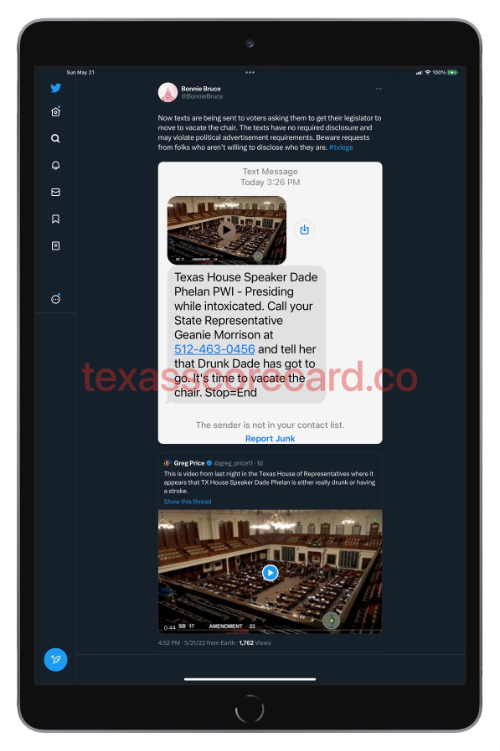The Diversion Game: Exposing Slaton Allies' Playbook in the Attack on Speaker Dade Phelan
James Madison expressed grave concerns about people like Sullivan, Stickland and their organizations in "Federalist No. 10"

In the realm of politics, the pursuit of power and the desire to avenge perceived wrongs can often lead individuals to resort to manipulative tactics. Such was the case when Jonathan Stickland released a deceptive video targeting Texas House Speaker Dade Phelan. This incident, which unfolded during the SB17 floor debate on May 19, 2023, raises questions about the motives behind Stickland's actions and their connection to the playbook outlined by Scorecard Confessions. By delving into this incident, we can uncover the complex web of revenge and manipulation at play.
The Deceptive Video
Recently a deceptive video was released by Jonathan Stickland, suggesting that Texas House Speaker Dade Phelan was intoxicated during the SB17 floor debate on Friday, May 19, 2023. The video shows moments where Speaker Phelan appears to be mumbling words, experiencing confusion, and having difficulty speaking or thinking of words.
Anyone who watches the #txlege House knows many of the members are regularly intoxicated.
— Jonathan Stickland (@RepStickland) May 21, 2023
Watching the Speaker be this wasted is absolutely unacceptable.
These Representatives are making laws that impact 30 million Texans. It must stop.pic.twitter.com/ETYH1sue9j
However, it is crucial to analyze the incident within its proper context. Prior to the deceptive cut in the video, Speaker Phelan can be observed speaking clearly and coherently. Furthermore, it is worth noting that moments later, Speaker Phelan was able to speak correctly and clearly, without any apparent impairment.
This observation strongly challenges the notion that Speaker Phelan was drunk during the incident. If someone were genuinely under the influence of alcohol, it would be highly improbable for them to exhibit an inability to speak in one instance and then suddenly regain full clarity moments later.
To provide alternative explanations for the brief momentary difficulty Speaker Phelan experienced in speaking, it is important to consider various health issues or factors unrelated to alcohol consumption. Temporary lapses in speech can occur due to reasons such as fatigue, stress, anxiety, or even a momentary lapse in concentration. These factors can impact an individual's ability to articulate their thoughts momentarily, without necessarily indicating alcohol intoxication.
By offering these alternative explanations, we can debunk the idea that Speaker Phelan's brief momentary difficulty could only have been caused by being drunk during the SB17 floor debate.
Stickland's Manipulation of Emotional Reactions
The release of Stickland's deceptive video, which insinuated that Speaker Phelan was intoxicated, is not only an example of dishonest tactics but also a calculated effort to stoke division and manufacture faux-outrage. By deliberately presenting a single explanation and suppressing alternative possibilities for Speaker Phelan's momentary difficulty in speaking, Stickland and his allies knowingly exploit their audience's susceptibility to prioritize immediate, emotional responses, they create a false dichotomy that polarizes public opinion and undermines the importance of nuanced analysis and critical thinking.
This divisive tactic is a betrayal of our trust and perpetuates a toxic political environment where misinformation and sensationalism thrive. Instead of engaging in substantive discussions and addressing the real issues at hand, Stickland and his allies prioritize the manipulation of public sentiment.
Revenge and the Slaton Airbnb Playbook
To understand Stickland's motivation, we must turn our attention to the Airbnb playbook—a strategic guide outlining tactics employed by a group seeking revenge for the expulsion of Bryan Slaton. Stickland's actions align with the objectives and tactics outlined in the playbook.
Moreover, Stickland's manipulation of the narrative surrounding Speaker Phelan's behavior mirrors a core tactic described in the playbook. By distorting the facts and presenting a misleading portrayal of Speaker Phelan's alleged intoxication, Stickland seeks to shape public opinion and control the narrative to advance his own agenda.
The deceptive video also serves as a tool to generate outrage and stir controversy. By creating a false narrative that Speaker Phelan was intoxicated, Stickland aims to provoke strong emotional reactions and fuel public anger. This approach aligns with the playbook's objective of using emotional manipulation to mobilize support and discredit opponents.
Additionally, the release of the deceptive video can be seen as a diversionary tactic. Stickland seeks to shift attention away from the expulsion of Bryan Slaton and any potential consequences it may have had on his own involvement and that of his allies. By creating a controversy surrounding Speaker Phelan's alleged intoxication, Stickland attempts to deflect scrutiny and accountability from his own actions, following the playbook's strategy of creating distractions and shifting blame.
Previous articles by Scorecard Confessions have provided valuable insights into their playbook, exposing their disingenuous strategies.
Selective Outrage
Since the expulsion of Bryan Slaton, it is striking to witness Jonathan Stickland's sudden and relentless accusations of alcohol use by Texas House members. In the span of just a few months, Stickland has leveled more allegations than he had in the previous four years. This surge in accusations raises questions about his true intentions. While it is indisputable that the use of alcohol on the floor of the Texas House of Representatives is highly unprofessional and immoral, Stickland and Sullivan's newfound outrage is not sincere but rather begrudgingly expressed. Their selective outrage is a disingenuous attempt to exploit a legitimate issue for personal gain and revenge.
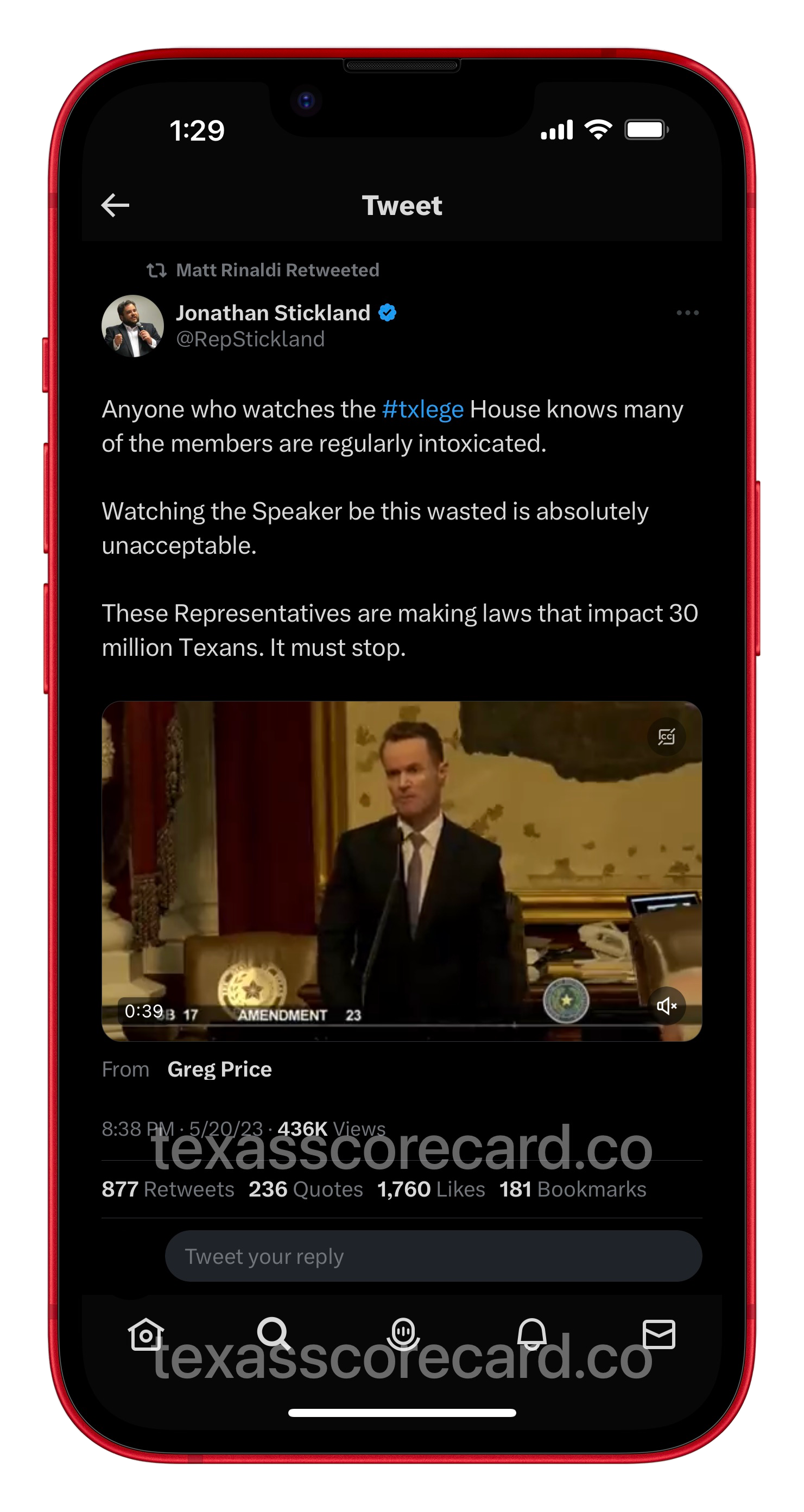
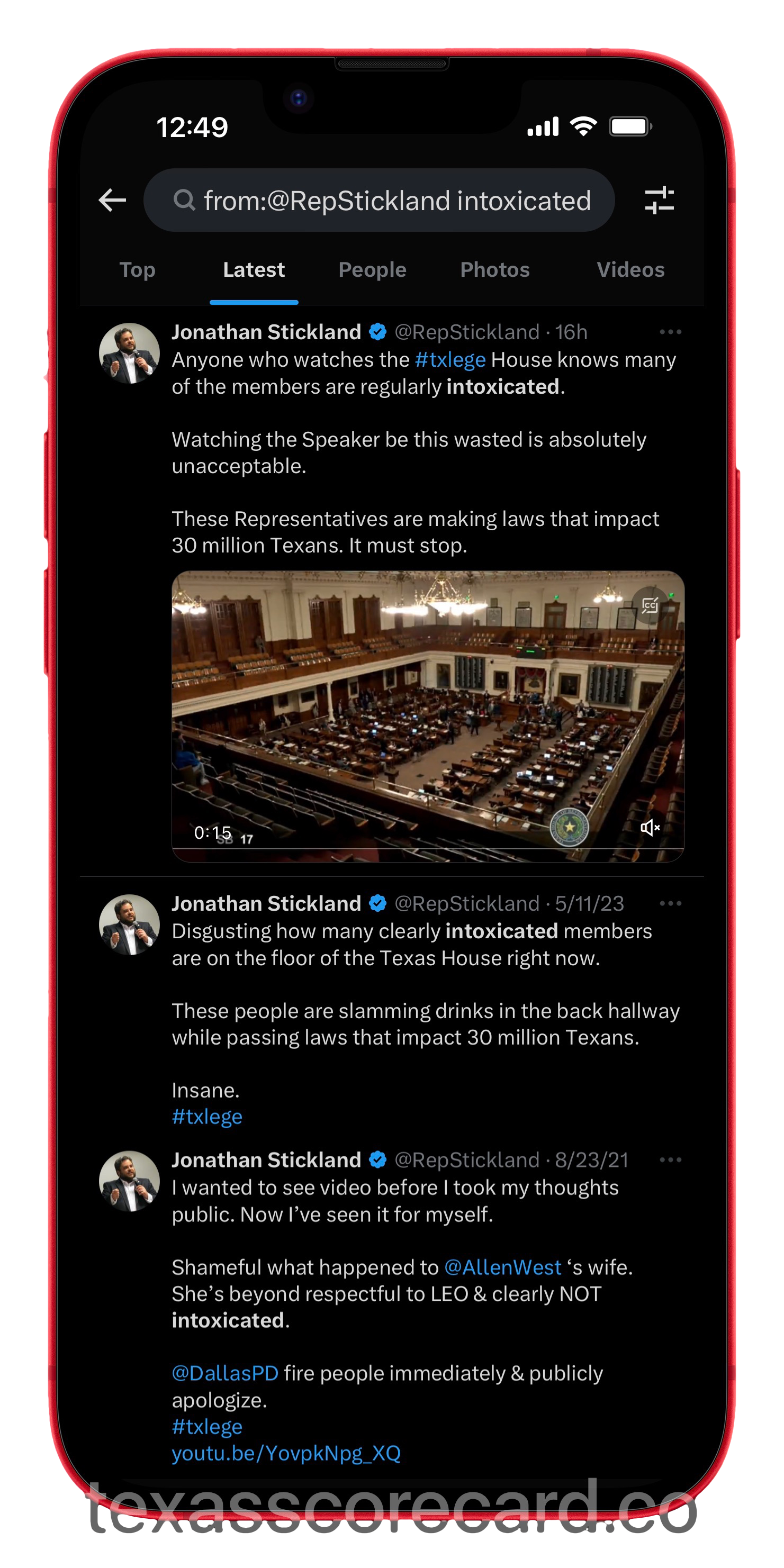
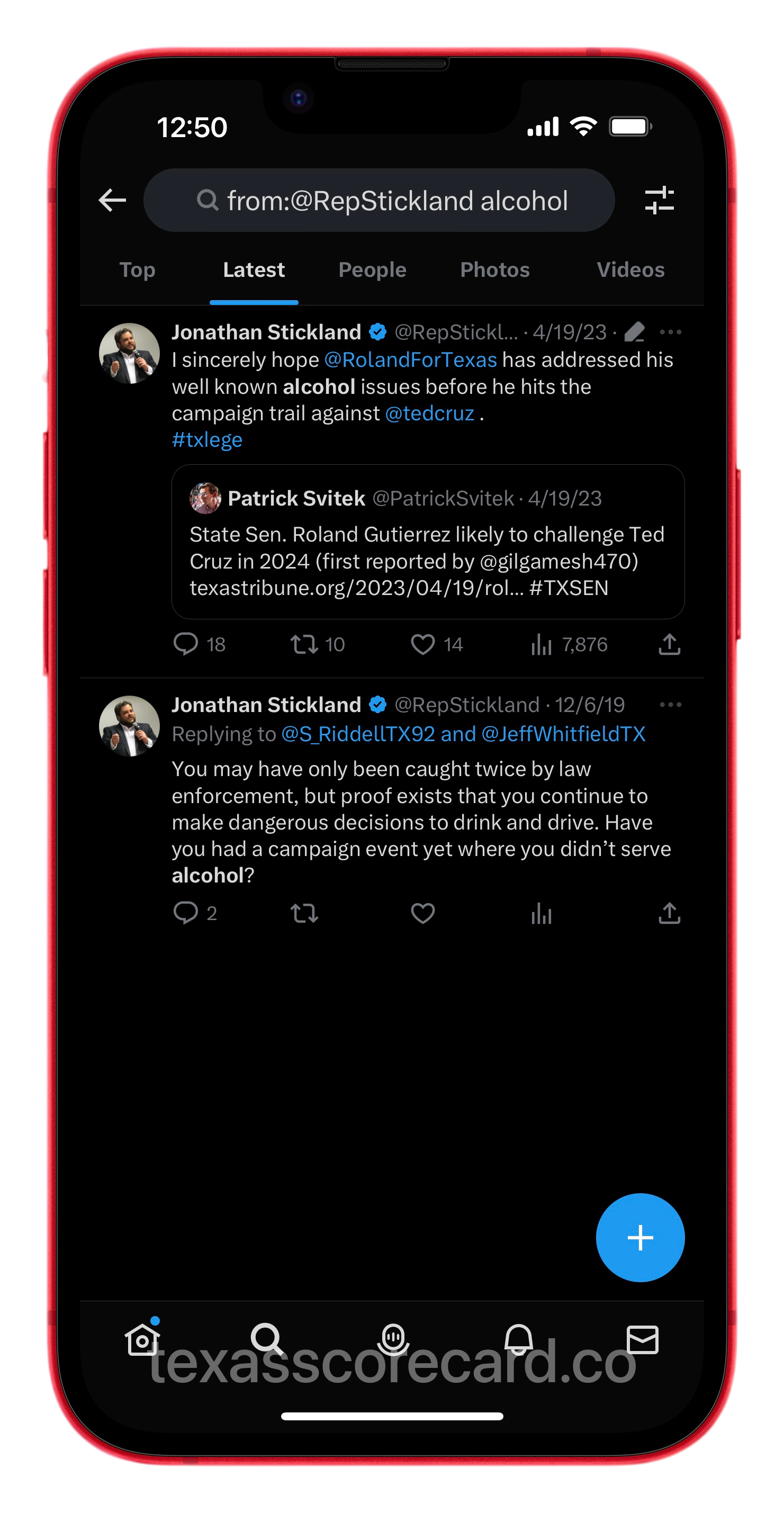
Jonathan Stickland's latest tweets accusing members of the Texas Legislature of being drunk
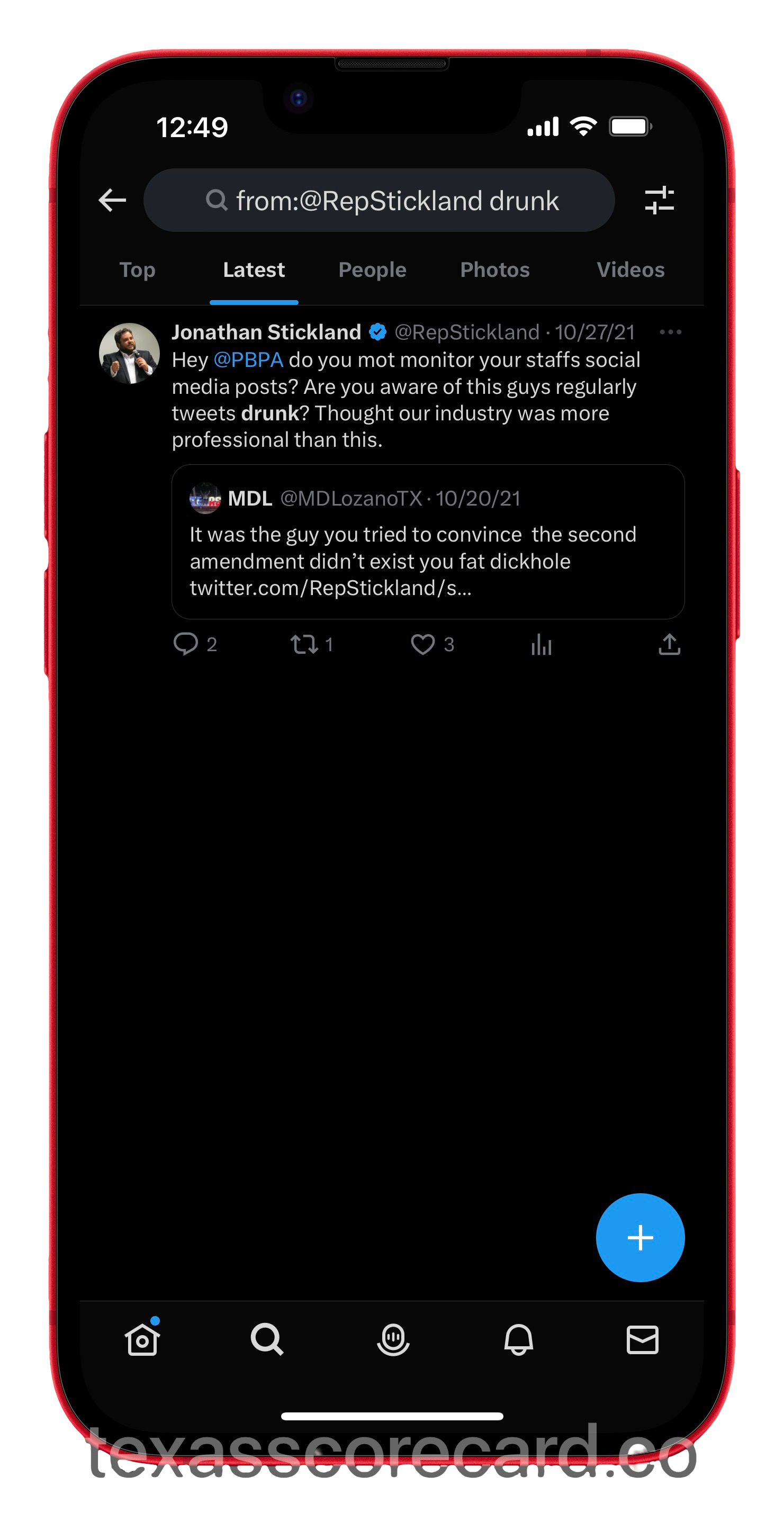
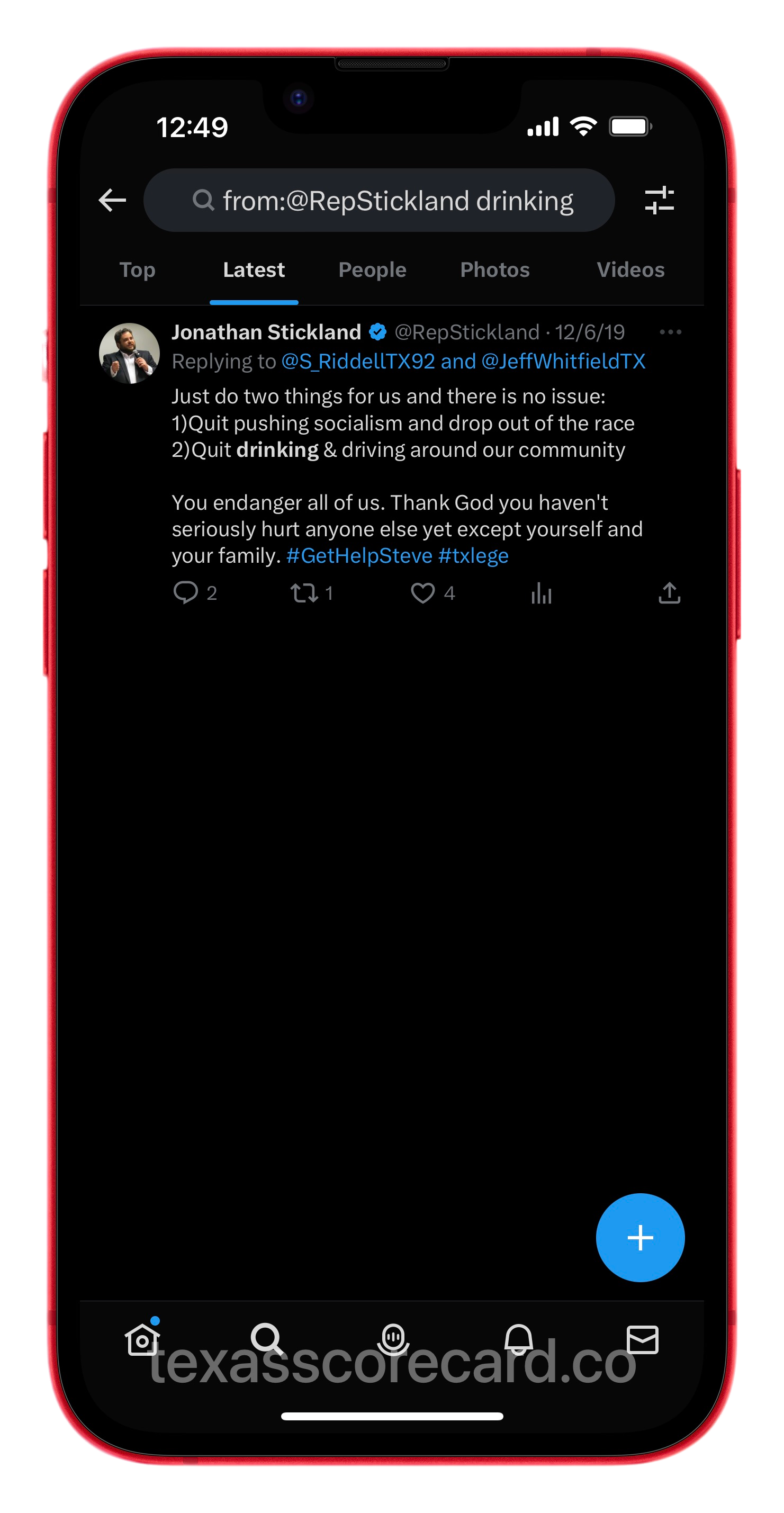
Total number of Stickland tweets referencing alcohol prior to the expulsion of Bryan Slaton
Orchestrating Diversion Campaigns and Cover-up
Stickland and Sullivan have consistently shown a willingness to orchestrate diversion campaigns and funding efforts to obstruct investigations and shield their allies. Instead of facing the consequences of Bryan Slaton's actions, they have actively worked to divert attention and undermine efforts to hold him accountable. This calculated strategy aims to protect their allies while perpetuating a disingenuous narrative.
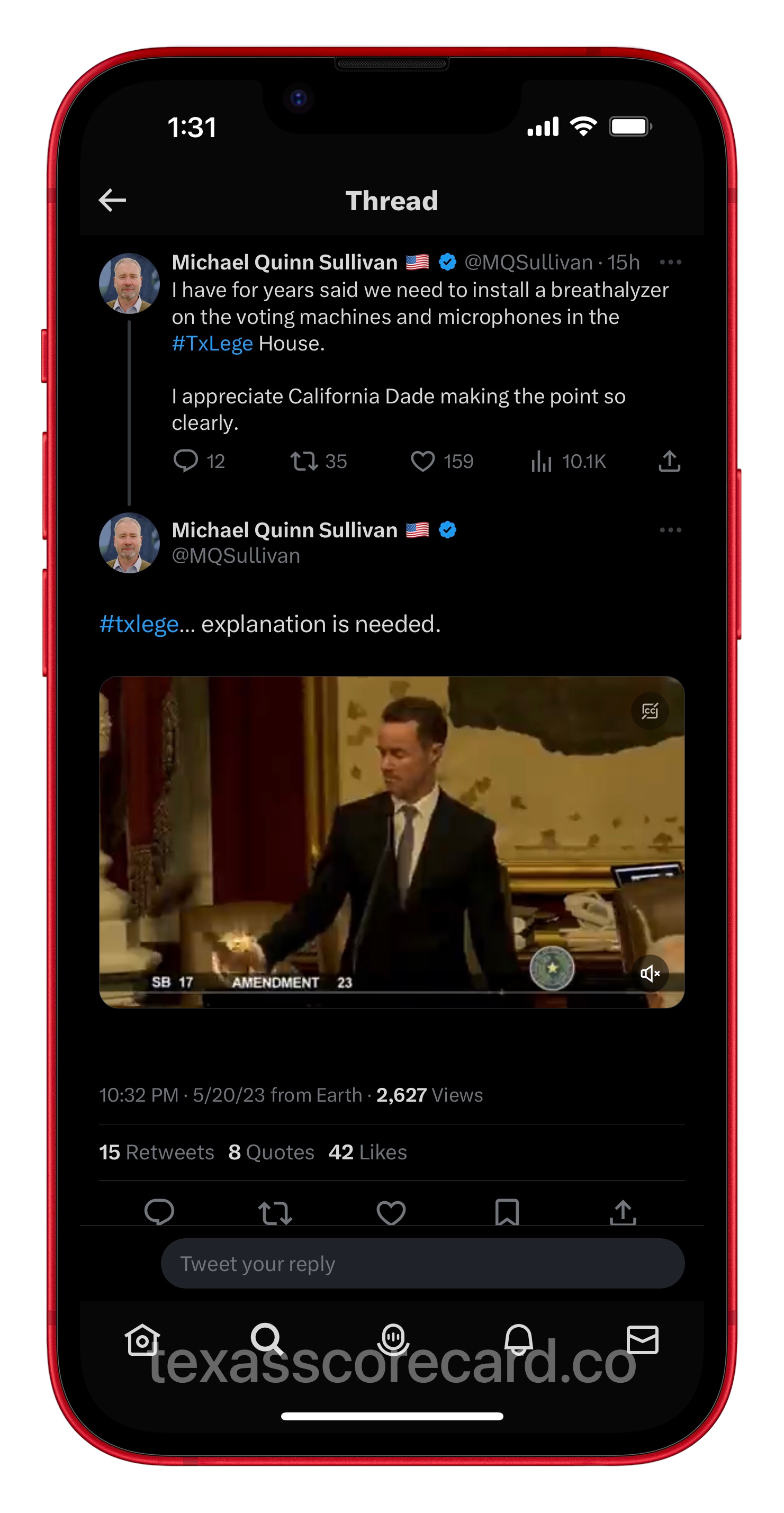
Concealing Their Own Complicity
The disingenuous actors at the center of this political drama are desperate to conceal their own complicity in covering up Bryan Slaton's actions. They demand accountability from others while evading it themselves, revealing a glaring hypocrisy.
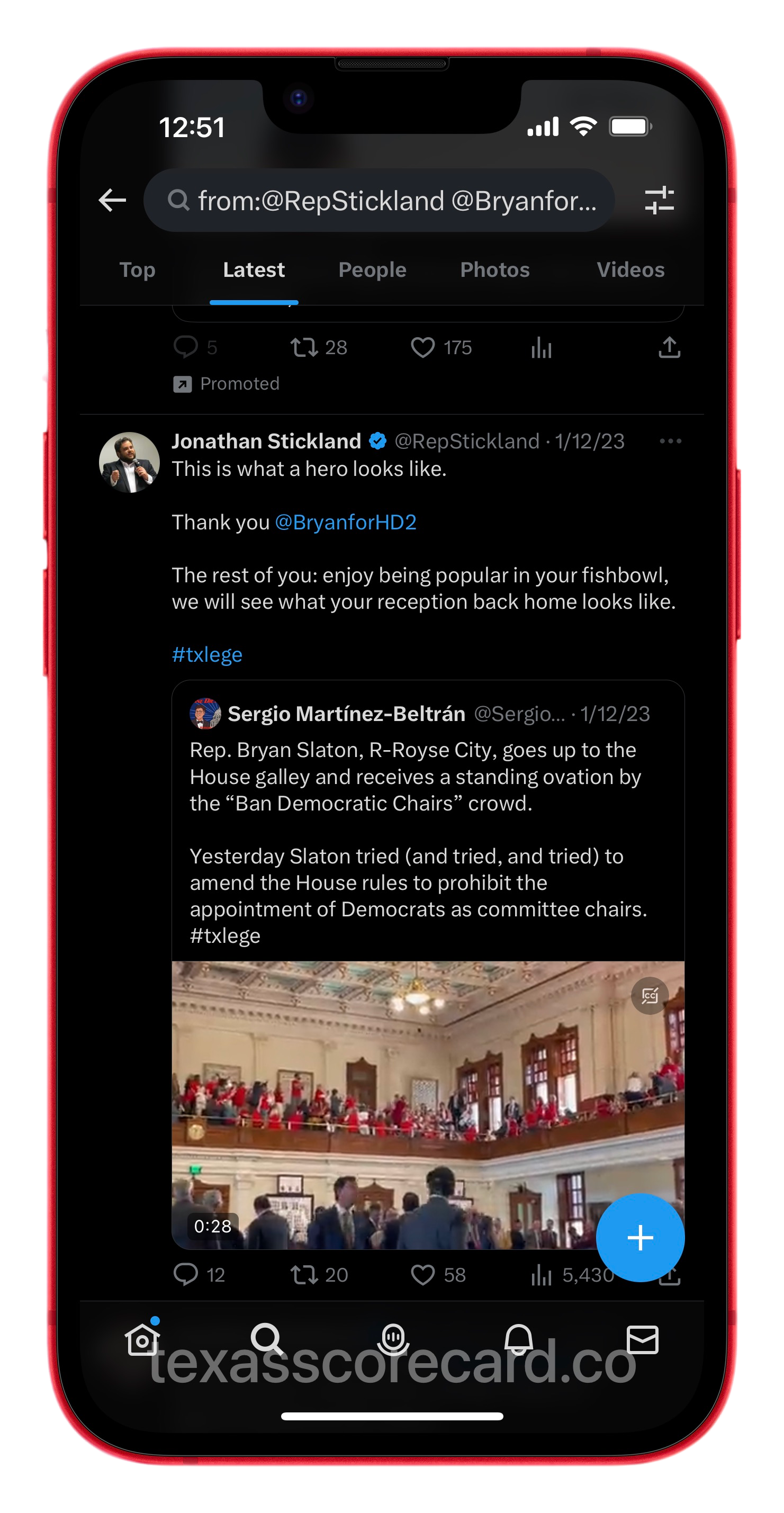
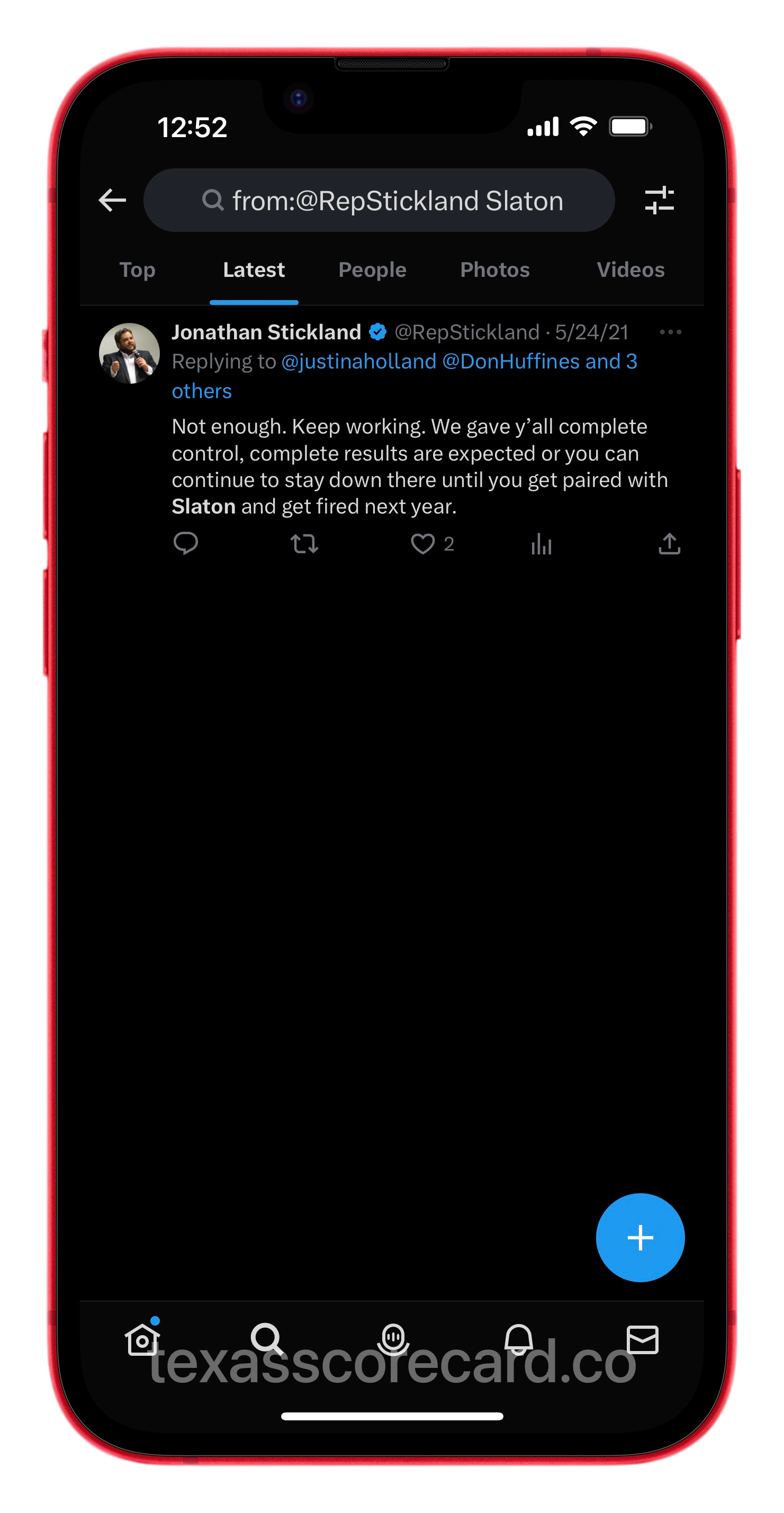

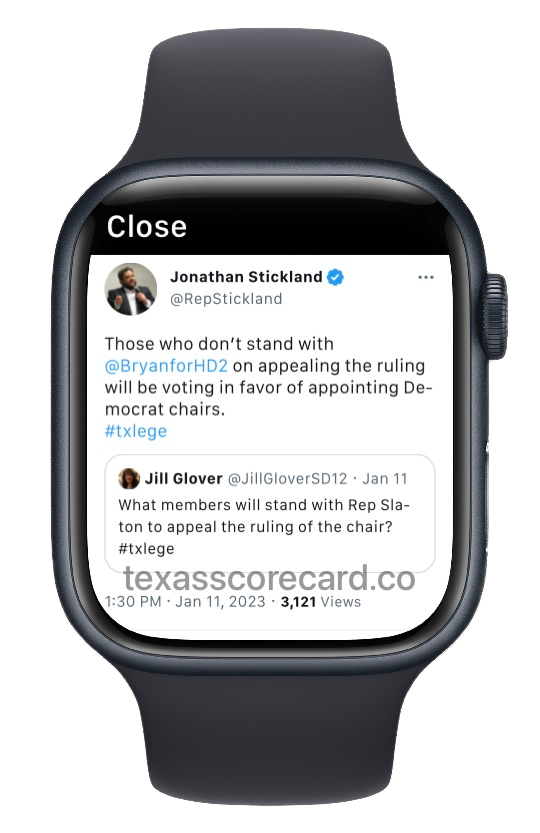
Most recent tweets from Jonathan Stickland referencing Bryan Slaton
Hold them accountable for their hypocrisy
The disingenuous outrage by Slaton's allies regarding legislative members drinking on the floor is part of a deceitful playbook. While the use of alcohol on the floor of the Texas House of Representatives is highly unprofessional and immoral, their newfound outrage is not sincere but rather a calculated attempt to exploit the issue for their own agenda. Texans must see through their calculated tactics and hold them accountable for their hypocrisy and attempts to manipulate public sentiment.
References:
Texas Scorecard allies plot to cover up Bryan Slaton's scandal
Slaton Allies pay RPT to unleash a diversion campaign
Shortly after the meeting on April 4:
The Republican Party of Texas received a generous donation of $100,000 from Jonathan Stickland's Defend Texas Liberty PAC.
Two days later, on April 6, Tim Dunn, the primary financier of Defend Texas Liberty PAC, contributed an additional $35,000 to the Republican Party of Texas.
Rinaldi and Texas Scorecard allies try to stop RPT SREC from condemning Bryan Slaton
-The Republican Party of Texas maintained silence regarding the Slaton investigation and his misconduct until after Slaton's resignation.
Rinaldi vehemently opposed any statements issued by the State Executive Committee (SREC) or the Republican Party of Texas that spoke out against Bryan Slaton.
Rinaldi recruited other Texas Scorecard allies within the SREC to assist him in fulfilling his commitments to Slaton's group, which seem to be in return for monetary compensation to RPT.
Stickland consistently uses manipulative tactics, taken from the playbook devised at the Airbnb meeting, to falsely equate the voluntary consumption of alcohol by adults with Slaton's act of getting a teenager drunk to engage in sexual activity.
This transparent ploy not only downplays Slaton's deeply troubling behavior, but also undermines the seriousness of the situation.
As we have revealed from the beginning through the help of sources, their disingenuous tactics and involvement in cover-up efforts have been exposed in previous articles by Scorecard Confessions. These articles have provided accurate sourcing and shed light on their deceitful strategies.
Revealing the Slaton cover up playbook
Over the past few days, supporters of Slaton and Texas Scorecard have resorted to whataboutism as a means of defending the Representative keeping his position.
Statements released by RPT Legislative Priorities Chair Jill Glover and RPT Chair Matt Rinaldi both alluded to the same strategy.
Here's the template:
Step 1: Unearth evidence to substantiate other alleged affairs, with most talk suggesting that these affairs involve two members.
Step 2: Disclose the information to media outlets that are supportive of the cause, allowing them to expose the misconduct.
Sept 3: Demand an investigation and/or expulsion of those members, by conflating their actions to Representative Slaton having sex with a teenager.
Step 4: In the event that the House fails to expel Slaton, falsely accuse the Speaker of hypocrisy. Assert that Slaton was only expelled because he was one of the few "true conservatives" in the legislature.
Revealing the implementation of their playbook
The plan is unmistakable through their actions:
- Downplay Slaton's behavior by using whataboutism, invoking rumors and previous reports on the behavior of other House members over multiple years.
- Attempt to discredit the General Investigation Committee by insinuating the process was unfair without providing any evidence.
- Deceive Texans by telling them not to believe their own eyes about a report filled with information they know first-hand is true, accurate, and authentic.
It is worth noting that their newfound concern for legislative members' alcohol use on the floor conveniently ignores their own history of obstructing investigations, manipulating funds, and orchestrating diversion campaigns. The hypocrisy is clear: they demand accountability from others while evading it themselves.
To further emphasize their disingenuous tactics, their Twitter screenshots showcase their accusations against members of the Texas Legislature regarding alcohol use. These screenshots serve as visual evidence of their selective outrage and provide a glimpse into their calculated attempts to create a false narrative.
James Madison expressed grave concerns about people like Sullivan, Stickland and their organizations in "Federalist No. 10"
Jonathan Haidt is a renowned social psychologist and professor of ethical leadership at New York University's Stern School of Business. He has extensively studied the psychological dynamics of moral and political beliefs, exploring how they shape individual and collective behavior. His work focuses on understanding the underlying psychological processes that drive human morality and the dynamics of moral and political polarization.
In his article "The Dark Psychology of Social Networks" published in The Atlantic in 2019, Haidt delves into the negative impact of social media on our political landscape. He highlights how the instant and widespread dissemination of inflammatory content through social networks fuels factionalism and intensifies polarization. Haidt argues that social media platforms have turned politically engaged individuals into virtual arsonists, competing to create and share the most provocative posts and images. This behavior diverts attention from the common good and undermines the ideals of reflection, deliberation, and thoughtful discourse.
The connection between the actions of individuals like Jonathan Stickland, Michael Quinn Sullivan, and their allies and the concerns raised by Haidt's article is striking. Their calculated tactics of spreading outrage, manipulating narratives, and engaging in selective outrage align with the destructive nature of social media-fueled factionalism. They exploit the instant and far-reaching nature of social media to promote inflammatory content, disregarding the common good and fostering mutual animosity.
James Madison's fears of factionalism, as expressed in "Federalist No. 10," become even more relevant in the context of today's social media landscape. Madison believed that the vastness of the United States would provide some protection against the spread of factionalism. The allure of instant gratification and the display of social metrics further exacerbate the corrosive effects of factionalism.
In essence, social media has transformed politically engaged individuals into Madison's nightmare of arsonists, spreading inflammatory content with ease and speed. The actions of Stickland, Sullivan, and their allies align with this destructive trend, fueling mutual animosity, diverting attention from the common good, and hindering reflection and deliberation.
We deserve better.
Condemning this deceptive behavior is essential for upholding the integrity of our political discourse and fostering a society that values thoughtful deliberation and evidence-based reasoning. It is incumbent upon the public to remain vigilant, question deceptive tactics, and demand accountability from our elected representatives.
As citizens, we must resist the allure of immediate, emotional responses and instead prioritize critical thinking and a nuanced understanding of complex issues. By doing so, we can counteract the divisive tactics employed by individuals like Stickland and actively participate in building a more informed and cohesive society.
UPDATE 5/21 @4:55 PM
A text message campaign has been launched, urging Republican voters in specific Texas House districts to contact their representatives and demand that they insist on the resignation of Speaker Dade Phelan. At the time of this update's publication, the funding source behind this targeted campaign remains unclear.
